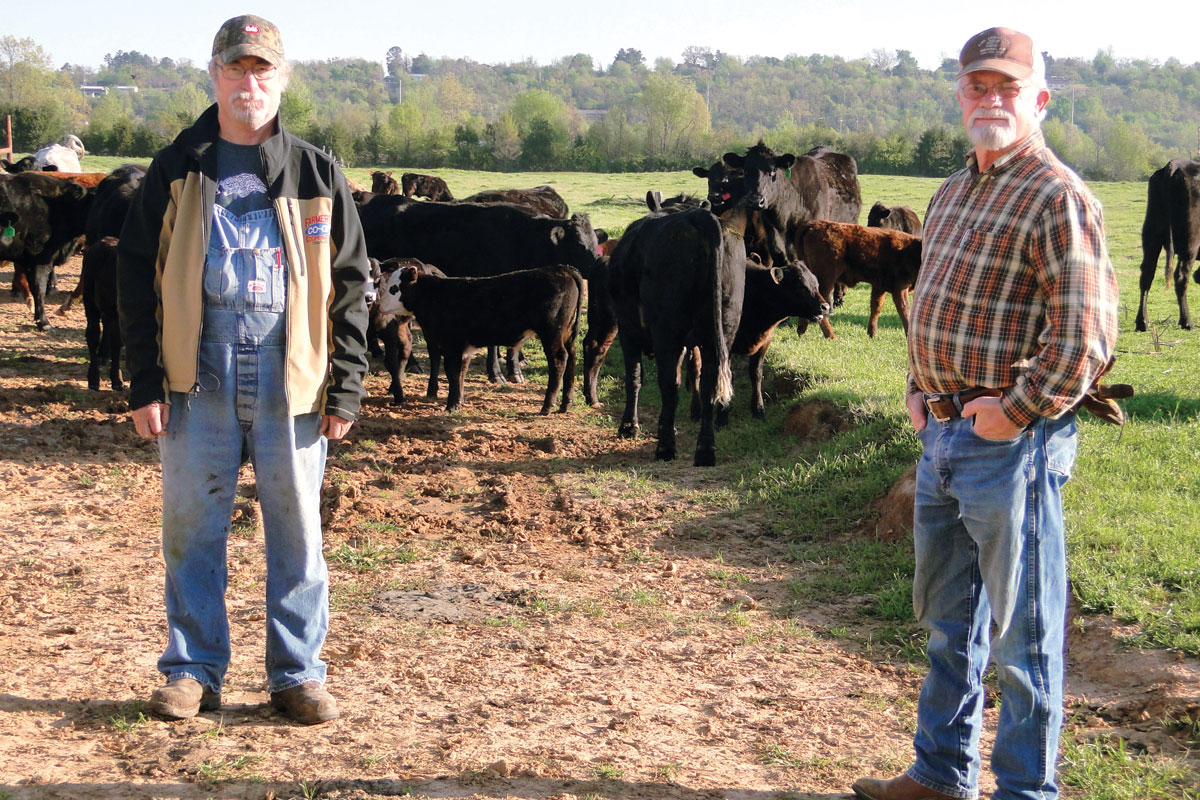
Bill and Kim Brockett of Ozark, Ark., married six years ago after meeting through friends and having a first date at Emmy’s German Restaurant in Fort Smith. They have five communal children and eight grandchildren ages 3 through 19.
Bill has two favorite grandkid memories. When four came to visit from Minnesota, Bill was tickled by one’s fascination with cow patties both in terms of size and number. He also chuckles every time he thinks about Sebastian at 6 years old figuring out he would have to walk about half a mile to get back from moving a tractor with his grandpa. He looked up at Bill and said, “That’s okay Pa Bill. You can leave me here. I’ll be just fine.”
In 1957, Bill’s father Clifton purchased 40 acres very close to the current farm for $30,000. A Texas sharecropper, he traveled back and forth between the two states until he paid off the land and his family joined him in 1962. In 1972, Bill joined the Navy but was forced to return two years later when his father had a heart attack. Bill finished his six-year commitment in the Reserves. Then his brother Weldon also had severe heart disease and became disabled. Bill bought his first 40 acres to help his brother adjust. Now in much better health, Weldon feeds the cattle and whatever else needs to be done at a pace that he determines day by day. Bill currently manages 700 leased and owned acres with Weldon working for a percentage.
Bill owns Hillbilly Realty in Ozark but is in the process of training someone to take over.
“I talk about retiring, but I’m just fooling myself because I like cattle, just bought a new hay mower, and am thinking I want another tractor even though I already have five,” Bill said. “I’m just like my 70-year-old salesperson, Wilma Dickerson, who says she’s afraid if she slows down she’ll stop.”
Bill began with a feeder operation but switched to a cow/calf because of market conditions. Finding lenders less than cooperative, he purchased his first 47 heifers himself and has never borrowed for stock.
Early on, when Bill went to auctions, he saw his calves didn’t look nearly as good as those selling for more money. He decided the main problem was a lack of consistency in supplying free choice minerals. Minerals became a top priority.
“Now my calves grow out faster and better and are the ones to bring a better price seeming to sell for 10 to 15 percent more,” Bill said.
Bill has four herds of crossbred Angus cows bred by seven commercial Angus and one registered Hereford bull because his preferred calf is a black baldie. He is developing that particular calf because, according to Bill, the market exists and “they are pretty look at.”
Because Bill likes two pay checks a year, he has both spring and fall calves. He weans at six months and finds their crying for their mommas his biggest challenge. Bull calves are castrated rather than banded because he believes the process is quicker and more certain. He dehorns and administers two rounds of vaccinations to the calves, with bulls and cows getting shots once a year. He also prefers an injectable, long-term wormer. The calves are creep fed which promotes growth and health as well as making weaning less stressful for them. The herds are checked daily and rotated according to grass height, the number of animals and the size of the pasture. Except for fence row issues and spring broadcast spraying, the cattle do the weeding.
“Arkansas is an excellent environment for cattle because it’s not subjected to the brutal cold of the north or the more frequent and severe droughts further south,” Bill said.
This year Bill is using four-way feed and chooses his feed in the fall for the entire year because he gets a better price. He purchases feed at the Co-Op because they do not charge for feed he doesn’t use, which is important when ordering 80 to 100 tons a year. Cows receive 5 pounds every day while heifers are fed daily. The cattle have free choice hay and used 900 of the 1,100 bales he harvested last year.
“Right now for HR Farms to make a decent profit I need to sell calves at 500 pounds for $1.50 a pound,” Bill said.
In the early 2000s, the immediate area was hit by a tornado that took two people’s lives and wreaked havoc with a number of farms. Bill lost two barns, fencing and a few animals. Two weeks were required to repair perimeter fencing for containment though cross fencing had to be repaired as well.
“I was luckier than most,” he said. “I replaced the two barns with a metal one but had to repair rather than replace fencing because the amount FEMA paid would not nearly cover the cost.”
Bill believes the tornado represented what is a universal challenge for farmers: insurance. He finds the price very expensive and carries a heavy liability policy but is self-insured for most of the rest.
“What I’ve learned is that farming, friends and health are what’s important,” he said. “Without those, nothing else means much.”






